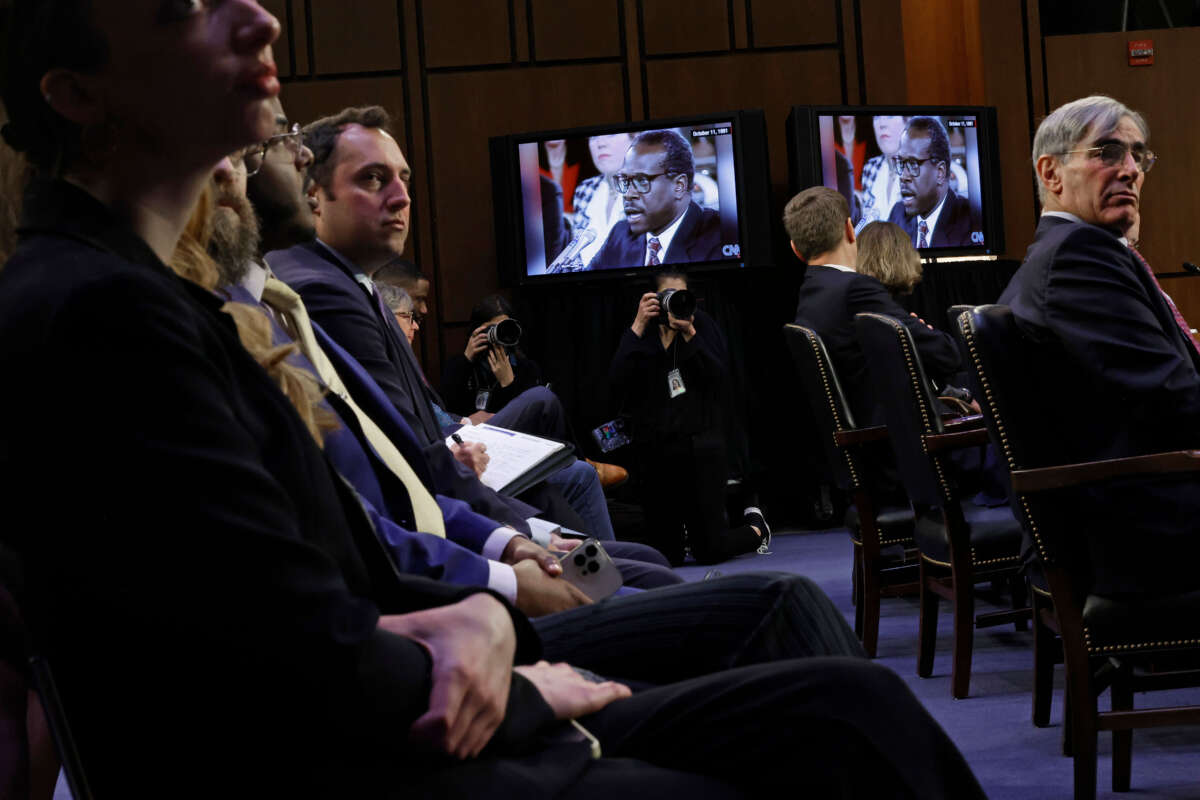For decades, an elite group of ultrawealthy and influential Americans has boasted the membership of Supreme Court Justice Clarence Thomas, and both the justice and the wealthy members of that network have benefited, a new investigation reveals.
Over the past months, Thomas’s financial relationship with conservative billionaire Harlan Crow has made headlines. But, as a new report by The New York Times published over the weekend reveals, Thomas actually has access to a much wider group of wealthy beneficiaries — access that has allowed Thomas to live a lavish lifestyle typically only enjoyed by the richest Americans, despite Supreme Court justices’ comparatively modest salaries.
Just months after Thomas was confirmed to the Supreme Court in 1991, he was welcomed into an exclusive group known as the Horatio Alger Association, named for an author known for writing novels with “rags to riches” themes due to the group’s own goal of promoting the supposed “bootstraps” narrative of the mythical American dream.
Before joining Horatio Alger, Thomas was well-connected by most standards, attending Yale Law School and serving under President Ronald Reagan as the chair of the Equal Employment Opportunity Commission in the 1980s. But membership in Horatio Alger gave Thomas an even more high-powered set of connections, marking his entry into the vast world of unmitigated wealth only accessible to the elite of the elite.
The group and its membership enjoy a level of access to power and wealth that is unimaginable to ordinary Americans; people familiar with the group say that joining Horatio Alger is akin to being knighted, while being in it is like being a member of the little-known aristocracy of the U.S. Its members include people like Reagan, Oprah Winfrey, Fox News chairman Roger Ailes and Donald Trump’s father, Fred Trump. Meanwhile, by welcoming Thomas into its ranks, the group has the ear of one of the most powerful people in the U.S.
Just as a member, Thomas has been able to attend exclusive events across the country — and the world. He has attended meetings by the group’s board of directors in places like Jamaica and Vancouver, Canada, which were accompanied by events like an exclusive performance by Johnny and June Carter Cash a year before Johnny Cash’s death, or an excursion to billionaire industrialist Dennis Washington’s island property in British Columbia.
Outside of the group’s regular business, fellow members of Horatio Alger have given Thomas “proximity to a lifestyle of unimaginable material privilege,” as The Times noted. Through Horatio Alger friends, Thomas has had VIP access to private retreats, lavish celebrity-filled parties and sporting events. Some even helped finance the marketing for a fulsome documentary about Thomas after an HBO movie resurfaced details about his alleged sexual harassment of Anita Hill.
Thomas has been deeply involved in the group, often meeting with and mentoring students who receive some of the millions of dollars that Horatio Alger gives away in scholarships each year.
The group has responded by naming Thomas an honorary board member and naming two scholarships after his son, Jamal Thomas. Those scholarships were directed to two Virginia prep schools — a school attended by a student Thomas was mentoring and a school attended by Thomas’s great nephew. Notably, Harlan Crow provided money to send Thomas’s great nephew, who the justice was raising as a son, to a different boarding school two years later.
In return, Thomas quite literally gives the scholarship recipients and other Horatio Alger members access to the Supreme Court. Every year, as part of a series of celebrations, Thomas welcomes the group into the Supreme Court, where the group holds its induction ceremony of roughly 10 new members — and where very few other members of the public are ever welcomed.
“They really treated him like a brother, like he mattered and, in return, he opened up the Supreme Court,” Armstrong Williams, conservative commentator and former close friend to Thomas, who helped the justice get into the group, told The New York Times.
“Let me tell you, Horatio Alger has been one of the best things that has ever happened to him,” Williams said. “This is also about power and prestige…. I mean, Thomas is on the Supreme Court. Even though they provide for these kids, this is the true aristocracy of America.”
Our most important fundraising appeal of the year
December is the most critical time of year for Truthout, because our nonprofit news is funded almost entirely by individual donations from readers like you. So before you navigate away, we ask that you take just a second to support Truthout with a tax-deductible donation.
This year is a little different. We are up against a far-reaching, wide-scale attack on press freedom coming from the Trump administration. 2025 was a year of frightening censorship, news industry corporate consolidation, and worsening financial conditions for progressive nonprofits across the board.
We can only resist Trump’s agenda by cultivating a strong base of support. The right-wing mediasphere is funded comfortably by billionaire owners and venture capitalist philanthropists. At Truthout, we have you.
We’ve set an ambitious target for our year-end campaign — a goal of $230,000 to keep up our fight against authoritarianism in 2026. Please take a meaningful action in this fight: make a one-time or monthly donation to Truthout before December 31. If you have the means, please dig deep.
